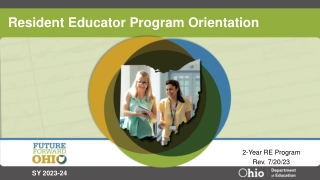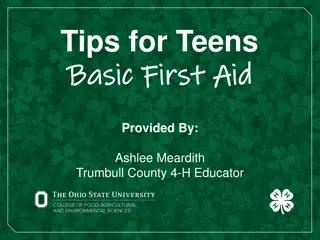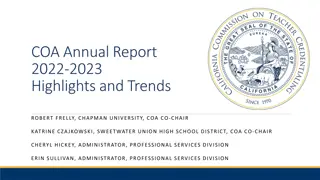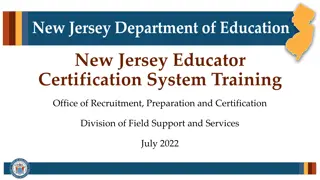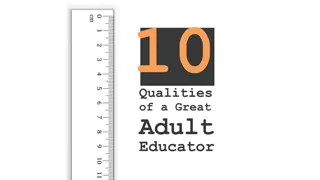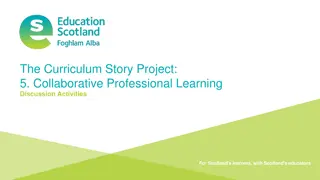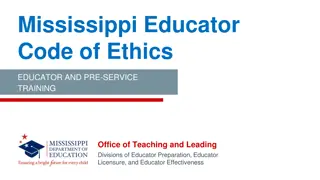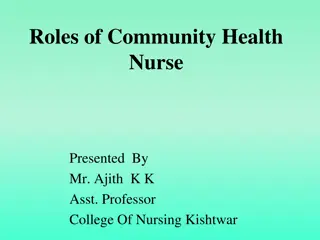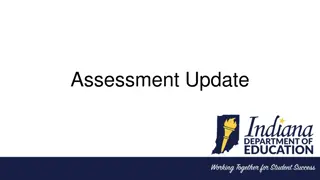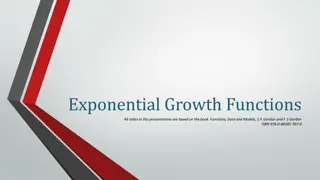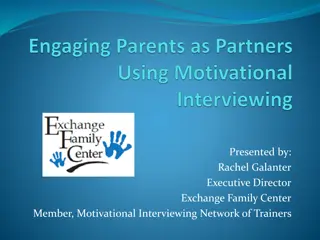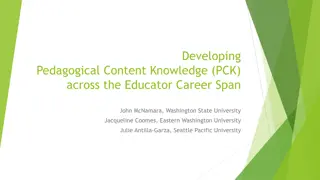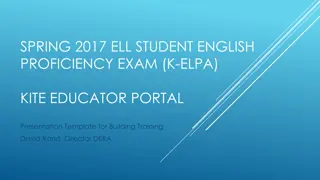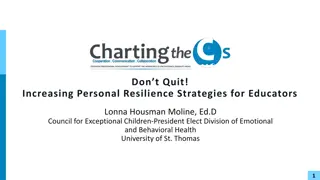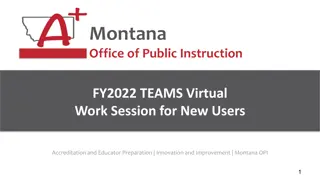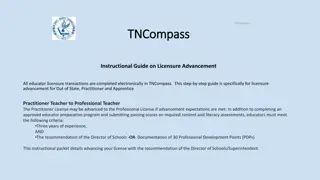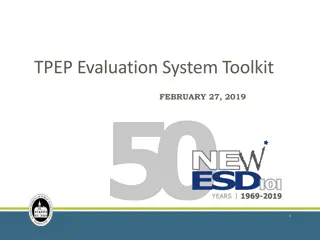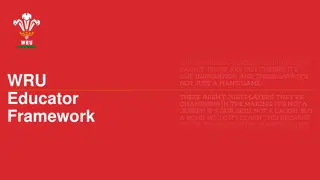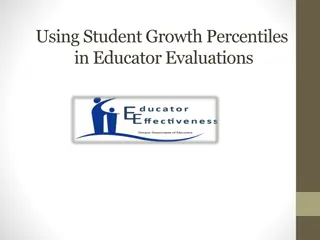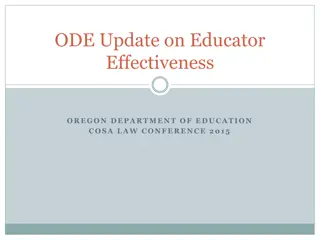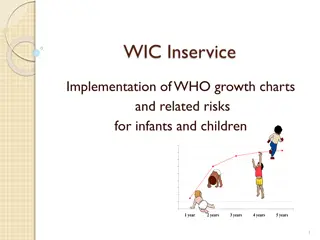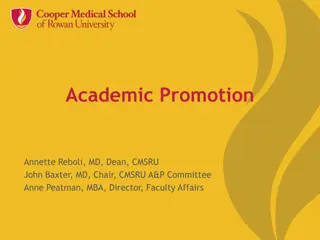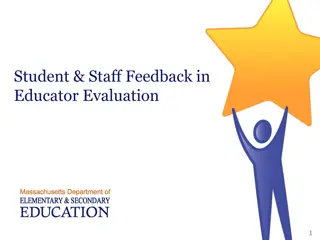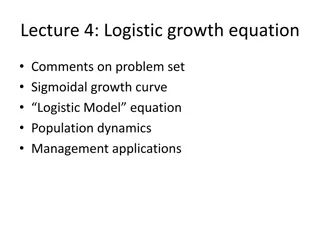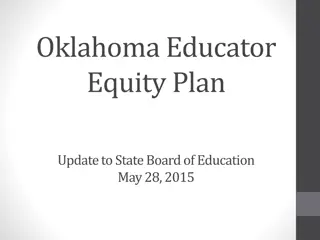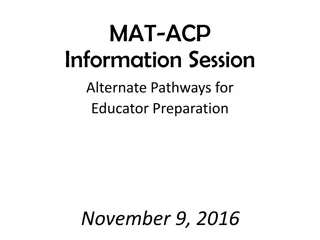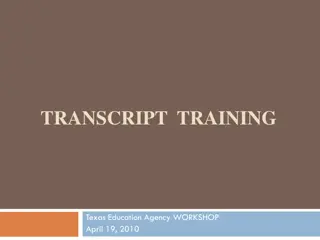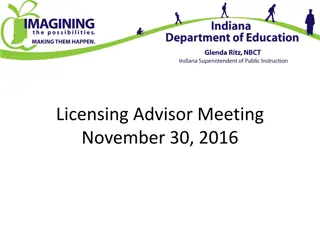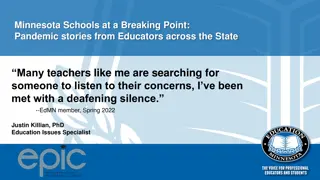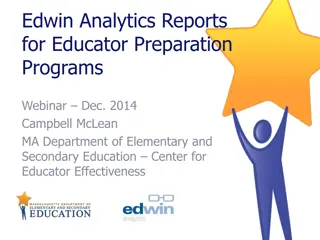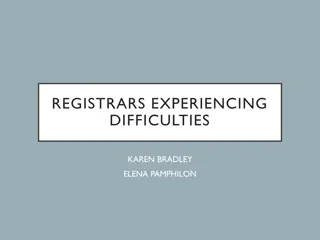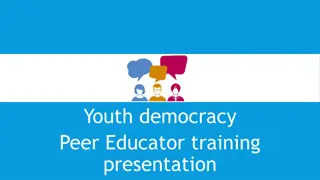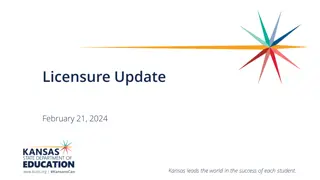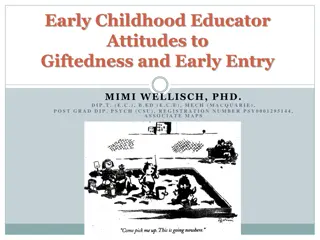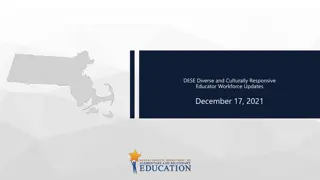Resident Educator Program Orientation
This orientation program provides information on the Ohio Resident Educator Program, including topics such as teacher residency and induction programs, mentoring principles, and the Resident Educator Summative Assessment (RESA). It also discusses the different types of Resident Educator Licenses and
1 views • 26 slides
Transforming Educator Preparation in Arizona
Arizona Coalition for Educator Preparation and Practice (ACEPP) is dedicated to improving educational outcomes by focusing on students with disabilities and enhancing professional learning for educators. Their initiatives include aligning state reading initiatives with High-Leverage Practices (HLPs)
0 views • 20 slides
The Role of Artifacts and Evidence in Educator Evaluation and Support
Exploring the role of artifacts and evidence in educator evaluation, this content covers the three categories of evidence required by the Oregon Framework. It delves into the efficient process that reduces redundancy, essential components of SLG goals, and the types of evidence relevant to professio
0 views • 15 slides
Teen Basic First Aid Tips by Ashlee Meardith Trumbull County 4-H Educator
Learn basic first aid tips for teens provided by Ashlee Meardith Trumbull County 4-H Educator. The tips cover handling bug/insect bites, animal bites, poisoning incidents, burns, cuts, and scrapes. Each section includes common symptoms and appropriate first aid measures to take in case of emergencie
4 views • 11 slides
Theresa S. Clark - Diabetes Educator Program Coordinator
Theresa S. Clark, MS, RD, LD, CDE, BC-ADM, is a dedicated Diabetes Educator and Program Coordinator at the Diabetes Resource Center in Hopkinsville, KY. She specializes in insulin therapies and teaches patients about insulin administration, carbohydrate counting, and mealtime insulin dosing. Certifi
1 views • 50 slides
California Educator Preparation Programs: Highlights and Trends 2022-2023
The California Educator Preparation Programs Annual Report for 2022-2023 showcases key highlights and trends in the field. It includes insights on accreditation status, site visits, distribution of institutions, largest number of preparation programs, and members of the Committee on Accreditation (C
0 views • 20 slides
New Jersey Educator Certification System Training Overview
The New Jersey Educator Certification System (NJEdCert) has replaced the Teacher Certification Information System (TCIS) to streamline the certification process. This system offers real-time updates, automated notifications, and enhanced reporting capabilities for educators, colleges, and school dis
0 views • 62 slides
Qualities of a Great Adult Educator
Discover the essential traits that make a great adult educator, including being creative, wise, empathetic, dedicated, humble, collaborative, persistent, organized, consistent, and courageous. Specific feedback is highlighted as crucial, creating intrinsic motivation and outlining reflective points
0 views • 39 slides
Transforming Lives Through Collaborative Professional Learning in Scotland
The Curriculum Story Project 5 offers discussion and practical activities for Scotland's educators to enhance interdisciplinary learning and collaborative professional development. It emphasizes the importance of creating dedicated time and space for collaboration, exploring new strategies for educa
0 views • 10 slides
Mississippi Educator Code of Ethics and Training Overview
The Mississippi Educator Code of Ethics aims to promote the health, safety, welfare, discipline, and morals of students and educators. Ethical training plays a crucial role in preparing administrators and teachers to make professional decisions. Violations of the code can be reported to the Mississi
0 views • 79 slides
Roles of Community Health Nurse: Presented by Mr. Ajith K.K.
Community Health Nurses play various roles including Clinician, Educator, Advocate, Manager, Collaborator, Leader, and Researcher. The Clinician role focuses on providing holistic care, health promotion, and wellness services to individuals, families, groups, and populations. The Educator role invol
1 views • 24 slides
ILEARN Assessment Update and Educator Resources Release
Updates on the ILEARN assessment process including draft blueprints, item specifications, educator involvement, and next steps. Get ready for the Item Acceptance Review in April followed by the release of resources on May 15, 2018 for educators and students. Explore new items aligned with Indiana st
0 views • 4 slides
Understanding Exponential Growth Functions Based on Gordon's Book
This presentation delves into exponential growth functions using real-world examples such as the population growth of Niger. It covers topics such as algebra with exponents, finding formulas for growth models, terminology, and graphing population growth over time. The content explores how exponentia
1 views • 21 slides
Meet Rachel Galanter: Motivational Interviewing Expert and Parenting Educator
Rachel Galanter, MPH, a seasoned Executive Director at Exchange Family Center, is a certified Parenting Educator with extensive experience in working with children, youth, and families. She utilizes Motivational Interviewing techniques along with various proven models to help families overcome barri
0 views • 57 slides
Developing Pedagogical Content Knowledge (PCK) for Educator Excellence
Explore how Developing Pedagogical Content Knowledge (PCK) throughout an educator's career enhances student learning and growth. Learn strategies to integrate content knowledge, pedagogy, and socio-emotional learning effectively. Discover the progression of teacher development from recruitment to le
2 views • 29 slides
KITE Educator Portal Training Guide for K-ELPA Coordinators
Access the KITE Educator Portal for the SPRING 2017 ELL Student English Proficiency Exam training. Learn how to log in, manage user roles, navigate the portal, and access important information for building test coordinators. Follow the steps outlined to ensure smooth coordination and efficient utili
0 views • 15 slides
Don't Quit!: Strategies for Educator Resilience
This session focuses on increasing personal resilience for educators, addressing the stress and challenges they face in their roles. Explore strategies, research on teacher retention, and interventions to support educator well-being. Learn about common stressors, resilience techniques, and ways to m
0 views • 57 slides
Montana OPI Virtual Work Session for New Users: Accreditation & Educator Preparation
Montana Office of Public Instruction (OPI) hosts a virtual work session for new users focusing on accreditation and educator preparation for the FY2022 TEAMS program. The session covers topics such as the accreditation process for the upcoming academic year, user roles and screens in TEAMS, SEID cre
1 views • 39 slides
Guide to Licensure Advancement for Educators in TNCompass
This instructional guide provides step-by-step information on advancing educator licensure from Practitioner to Professional in TNCompass. Key requirements include three years of experience, completion of an approved educator preparation program, passing required assessments, and either a recommenda
0 views • 18 slides
Effective Educator Evaluation System Toolkit for Districts
The TPEP Evaluation System Toolkit provides a comprehensive guide for leading educator evaluation systems in schools and districts. It covers key elements such as district leadership, professional learning, and self-assessment opportunities. The toolkit aims to enhance educator effectiveness and pro
0 views • 20 slides
Enhancing Educator Success: The WRU Educator Framework in Action
WRU Education aims to empower a successful educator workforce through positive learning experiences and a robust Educator Framework. By focusing on recruitment, retention, and development, WRU ensures a thriving workforce through accessible learning programs. The implementation of the EAST principle
0 views • 19 slides
Understanding Student Growth Percentiles in Education Evaluation
This collection of resources covers topics such as using student growth percentiles in educator evaluations, identifying median heights of students, establishing norms for collaborative environments, and discussing outcomes related to student growth percentiles in education reform. It touches on upd
0 views • 55 slides
Oregon Department of Education Update on Educator Effectiveness - 2015 Conference Highlights
Explore key topics from the 2015 COSA Law Conference, including educator effectiveness updates, student growth percentiles, norms for collaboration, learning objectives, ESEA waiver insights, and more.
0 views • 37 slides
Implementation of WHO Growth Charts for Infants and Children
Growth charts are essential for assessing children's growth, with WHO setting international standards since 2006. The discussion includes interpreting growth charts, the history of growth references, and the difference between reference and standard growth. It compares CDC's U.S. growth reference to
0 views • 30 slides
Guidelines for Academic Promotions in Medical School
Academic promotions in a medical school are crucial for recognizing achievements, maintaining competitiveness, and serving the institution's interests. Promotion criteria include teaching effectiveness, scholarly activity, clinical service, and active participation in various communities. Meritoriou
0 views • 47 slides
Importance of Student and Staff Feedback in Educator Evaluation
Student and staff feedback plays a crucial role in educator evaluation, providing valuable insights into areas of strength and growth. Informed by evidence such as surveys, observations, and artifacts, feedback helps educators tailor their practice, fostering two-way communication and professional d
0 views • 14 slides
Understanding Logistic Growth in Population Dynamics
Explore the logistic growth equation and its applications in modeling population dynamics. Dive into the concept of sigmoidal growth curves and the logistic model, which reflects population growth with limits. Learn how to calculate population change using the logistic growth equation and understand
0 views • 26 slides
Educator Preparation & Pathways (EP&P) Overview and Staff Information
Discover an overview of the Educator Preparation & Pathways (EP&P) program, including details about the EP&P Committee, Oregon Administrative Rule Chapter 584, and staff contacts. Meet key personnel such as Dr. Shara MonDragon, Kirsten Plumeau, Kristin Rush, Dr. Mark Van Ryzin, Richelle Krotts, and
0 views • 5 slides
Update on Oklahoma Educator Equity Plan to State Board of Education
Oklahoma's Educator Equity Plan Update to the State Board of Education on May 28, 2015, highlighted challenges identified by stakeholder focus groups, including equity gaps in teacher distribution in high poverty and minority schools. The plan focuses on addressing two main equity gaps related to te
0 views • 8 slides
Alternate Pathways to Educator Certification at TAMIU
Learn about the Alternate Pathways to Educator Certification at Texas A&M International University (TAMIU) including the Alternative Certification Program (ACP) and Master of Arts in Teaching (MAT). Discover the requirements, courses, and certification areas available for aspiring educators.
0 views • 16 slides
Texas Educator Preparation Program Admission Criteria
Texas Administrative Code Title 19, Chapter 227 outlines the admission criteria for educator preparation programs in Texas. Candidates must meet specific requirements based on the type of program they are applying to, such as having a minimum GPA of 2.5, relevant work experience, and subject-specifi
0 views • 30 slides
Enhancing Educator Licensing Standards in Indiana
Our mission is to set and uphold high licensing standards for educators in Indiana's P-12 schools. By collaborating with higher education preparatory programs, we aim to ensure quality instruction through professional development and training. Responsibilities include verifying program completion, m
0 views • 20 slides
Minnesota Schools at a Breaking Point: Educator Voices Amidst Pandemic Challenges
Educators in Minnesota are facing unprecedented challenges, including systemic failures, unsafe working environments, and educator attrition. The Educator Policy Innovation Center highlights the severity of the situation, emphasizing the voice of educators and the impact on students. National trends
0 views • 10 slides
Comparison of 1:1 Model in Clinical Education
The experience of a 1:1 model in clinical education is compared with literature, highlighting advantages such as peer support, autonomy, and job satisfaction, and disadvantages such as limited contact time and increased stress. The model's impact on productivity, student learning, and educator workl
0 views • 7 slides
Edwin Analytics Reports for Educator Preparation Programs Overview
Edwin Analytics is a comprehensive platform housing analytical tools for educator preparation programs. It offers various reports catering to stakeholders at different levels, from superintendents to classroom teachers. The platform includes features like the Early Warning Indicator System and Posts
0 views • 24 slides
Enhancing Educator Practices in Training Programs
Explore key topics related to educator responsibilities, from recording crucial information to addressing trainee concerns and identifying common themes. Discover strategies for giving feedback, understanding trainee needs through Maslow's Hierarchy of Needs, and overcoming challenges such as langua
0 views • 32 slides
Youth Democracy Peer Educator Training Presentation
This presentation covers topics such as introductions, icebreaker activities, the importance of voter registration, the role of a peer educator, engaging young people to register to vote, scenarios for learning, and more. It aims to educate and empower youth in understanding democracy, electoral pro
0 views • 15 slides
Educator Licensure Update and Program Highlights
Update on licensure requirements, upcoming deadlines, and nontraditional routes to the classroom in Kansas. Information on out-of-state licenses, mentor programs, and educator preparation accreditation. Details on limited residency licenses, teacher apprenticeship programs, and the Teacher Mobility
0 views • 27 slides
Early Childhood Educator Attitudes to Giftedness Research Overview
Early Childhood Educator Attitudes to Giftedness and Early Entry research by Mimi Wellisch, PHD, explores the impact of gifted training on educator attitudes. It discusses the evolution of attitudes, training in giftedness, and regulation requirements for young gifted children in NSW. The research c
0 views • 33 slides
Enhancing Diversity in the Educator Workforce: Strategies for Success
Massachusetts Department of Elementary and Secondary Education (DESE) is focused on creating a more diverse and culturally responsive educator workforce by addressing barriers faced by individuals of color. By promoting the benefits of becoming educators, providing financial incentives, and improvin
0 views • 16 slides
